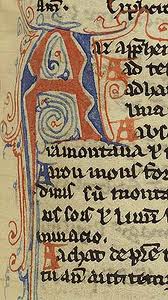
A friend of mine has spent several months now sticking to her daily writing goal of ‘just showing up.’ Inspired by Elizabeth Gilbert’s TED Talk, she doesn’t set a daily word count or number of hours spent at the keyboard or journal that, once accomplished, means that she’s met her goal. Her goal is just to turn up ready to write and do the best she can. And it’s working. Stories are being written, ideas are flowing, and on the days when the stories aren’t written and the ideas don’t flow, she knows she’s done her part and showed up.Well, suddenly finding myself with time to write and actually having absolutely no ideas, I decided to do the same thing. I decided to “show up” in my own way. Several years ago I wrote a couple of children’s stories set in England around 1190. They were going to part of a mystery series, but I’d never been happy with how I’d constructed the mysteries. I liked the characters a lot, but the stories were clunky, so I decided to show up by doing my homework. I uploaded James N. Frey’s How to Write a Damn Good Mystery to my Kobo reader, freed a journal from my stash and started reading, taking notes and doing the exercises. This was becoming my (almost) daily writing routine, and being a born student, I was enjoying the work. Then—
I went to the last of three medieval history and art presentations at the local Joseph Schneider Haus Museum, and I found out why I was “showing up.” The final presentation was about medieval bookmaking and was presented by miniature painter and limner, Debbie Thompson-Wilson. By the time I’d driven home, I had started building the frame of my story. Lessons from the Frey book connected to the pieces I was assembling in my imagination, and the characters that I thought I already knew spoke with stronger voices.
Now I know there is a long way to go before what I have in my head and in my journal actually becomes a final product—but I wouldn’t be on a journey at all if I hadn’t followed my friend’s advice and just “showed up.”
Where and when do your stories come to you? Do you find that they appear more often when you have nothing to write or do they arrive when you’re engrossed in other projects? How to you prime the imagination well?






